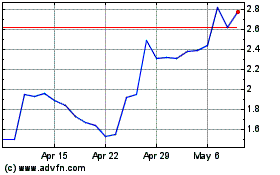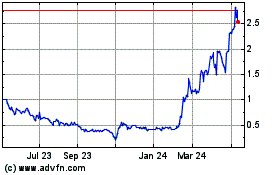Medicenna Therapeutics Corp. (“Medicenna” or the “Company”) (TSX:
MDNA, OTCQB: MDNAF), a clinical-stage immunotherapy company focused
on the development of Superkines, announced today that the American
Society of Clinical Oncology ("ASCO") decided to reverse its
decision and to withdraw Medicenna’s abstract entitled “Results
from ABILITY-1 Monotherapy Dose Escalation Study with MDNA11, an
Engineered Long-acting IL-2 agonist, in patients with advanced
solid tumors,” which had been initially selected for an oral podium
presentation at ASCO’s 2024 Annual Meeting. ASCO advised the
Company that the reason for this withdrawal was that the Program
Committee had determined that the Company had allegedly violated
ASCO’s “Prior Publication Policy” by previously reporting results
at the 2024 Annual Meeting of the American Association of Cancer
Research (“AACR”). No other concerns were raised by the ASCO
Program Committee.
The Company disagrees with the ASCO Program
Committee’s decision to withdraw the oral podium presentation. In
the Company’s opinion, it did not violate ASCO’s Prior Publication
Policy. While the Company did present results at the AACR, the AACR
abstract explicitly referenced a data cut-off date of December 23,
2023, and only on-going interim monotherapy results were presented,
whereas the ASCO abstract specified that the results presented
would focus on a complete Phase 1 monotherapy data set without a
data cut-off date. This complete data set was analyzed and prepared
specifically for presentation at ASCO 2024.
“Medicenna is disappointed by ASCO’s Scientific
Program Committee’s decision, as we are now unable to share our
ground-breaking results that demonstrate ongoing deep and durable
responses in advanced solid tumors as a single agent in the
ABILITY-1 clinical trial of MDNA11 at ASCO,” said Dr Fahar
Merchant, President and CEO of Medicenna. “The potential to present
data from the ABILITY-1 trial at ASCO would have been a tremendous
honor, reflecting the investment of many patients, their families
and investigators in the trial that has demonstrated promising
advancement in cancer care, bringing comfort of a potential cure to
patients through development of this highly promising molecule. The
ABILITY-1 trial demonstrates robust single agent activity in tumor
types not previously shown to have durable response to IL-2 based
therapies—a significant feat. Given the strong interest by many
stakeholders in our MDNA11 program, we look forward to sharing the
full high impact data set at a special virtual event to be
organized over the next 2 to 4 weeks with more details to be
announced shortly.”
At the event, clinical data originally planned
for the 2024 ASCO Annual Meeting and that has not previously been
presented at any external conference, including AACR (summarized in
the table below), will be presented from the ongoing Phase 1/2
ABILITY-1 Study evaluating MDNA11, a long-acting ‘beta-enhanced
not-alpha’ interleukin-2 (IL-2) super-agonist, as both a
monotherapy and in combination with pembrolizumab (KEYTRUDA®) in
patients with advanced or metastatic solid tumors. The data set to
be presented will include the full data from the monotherapy
dose-escalation arm, updated data from the monotherapy
dose-expansion arm and preliminary data from the combination
study.
A photo accompanying this announcement is available at
https://www.globenewswire.com/NewsRoom/AttachmentNg/d0b996ca-ed88-4a91-8a88-5e940c9cc44b
Notably, the MDNA11 abstract was submitted for
presentation at the 2024 Annual Meeting of ASCO on 6th February
2024. On March 29th, 2024, the lead-author was notified by the ASCO
Scientific Program Committee Chair that the submitted abstract was
accepted as an oral podium presentation. On April 5th, 2024, AACR
published the full abstracts for their 2024 Annual Meeting,
including the MDNA11 abstract. On April 24th, 2024, 19 days after
the publication of the AACR Abstracts, ASCO, and subsequently
Medicenna, announced the acceptance of MDNA11’s abstract as an oral
presentation. However, ASCO subsequently decided to withdraw the
MDNA11 abstract from the ASCO 2024 program, citing “Prior
Publication Policy Violation.”
Medicenna and the lead-author requested ASCO to
reconsider their withdrawal explaining that while the data in the
AACR 2024 abstract was time-limited and in-progress, the ASCO 2024
abstract covered the completed Phase 1 portion of the study and a
good-faith intent to provide substantially new data never
previously presented at any other conference, including AACR 2024
(see Table above). ASCO continues to maintain its position and the
Company believes that it has fully exhausted all available avenues
to secure a reversal of the decision by ASCO.
MDNA11 continues to demonstrate its potential to
be a ‘best-in-class’ IL-2 agonist through its compelling
single-agent activity and has been differentiated from other IL-2’s
in clinical development by its deep and durable responses in the
ABILITY-1 study amongst high-dose phase-2 eligible patients (N=14)
with advanced solid tumors who have failed checkpoint inhibitor
therapies. As of the March 22, 2024, data cut-off date, MDNA11 has
demonstrated a response rate of 29% (4 partial responses) and a
clinical benefit rate of 50% (4 partial responses, and 3 stable
diseases > 24 weeks).
The second abstract of the Company, offering new
data analyses for bizaxofusp (formerly known as MDNA55), a Phase-3
ready immunotherapy for recurrent glioblastoma, will be presented
as a poster at the 2024 ASCO Annual Meeting, as previously
announced by the Company. The full text of the published abstracts
can be found on the 2024 ASCO Annual Meeting.
About MDNA11
MDNA11 is a long-acting ‘beta-enhanced
not-alpha’ interleukin-2 (IL-2) Superkine specifically engineered
to overcome the shortcomings of aldesleukin and other next
generation IL-2 variants by preferentially activating immune
effector cells (CD4+ T, CD8+ T and NK cells) responsible for
killing cancer cells, with minimal or no stimulation of
immunosuppressive Tregs. These unique proprietary features of the
IL-2 Superkine have been achieved by incorporating seven specific
mutations and genetically fusing it to a recombinant human albumin
scaffold to improve the pharmacokinetic (PK) profile and
pharmacological activity of MDNA11 due to albumin’s natural
propensity to accumulate in highly vascularized sites, in
particular tumor and tumor draining lymph nodes. MDNA11 is
currently being evaluated in the Phase 1/2 ABILITY-1 study as both
a monotherapy and in combination with pembrolizumab
(KEYTRUDA®).
About the ABILITY-1 Study
The ABILITY-1 study (NCT05086692) is a global,
multi-center, open-label study that assesses the safety,
tolerability, pharmacokinetics, pharmacodynamics and anti-tumor
activity of MDNA11 as monotherapy or in combination with
pembrolizumab (KEYTRUDA®). In the combination dose escalation of
the Phase 2 study, approximately 6-12 patients are expected to be
enrolled and administered ascending doses of MDNA11 intravenously
once every two weeks in combination with pembrolizumab. This
portion of the study includes patients with a wide range of solid
tumors with the potential for susceptibility to immune modulating
therapeutics. Upon identification of an appropriate dose regimen
for combination, the study will proceed to a combination dose
expansion cohort.
About Medicenna
Medicenna is a clinical-stage immunotherapy
company focused on developing novel, highly selective versions of
IL-2, IL-4 and IL-13 Superkines and first-in-class Empowered
Superkines. Medicenna’s long-acting IL-2 Superkine, MDNA11, is a
next-generation IL-2 with superior affinity toward CD122 (IL-2
receptor beta) and no CD25 (IL-2 receptor alpha) binding, thereby
preferentially stimulating cancer-killing effector T cells and NK
cells. Medicenna’s IL-4 Empowered Superkine, bizaxofusp (formerly
MDNA55), has been studied in 5 clinical trials enrolling over 130
patients, including a Phase 2b trial for recurrent GBM, the most
common and uniformly fatal form of brain cancer. Bizaxofusp has
obtained FastTrack and Orphan Drug status from the FDA and FDA/EMA,
respectively. Medicenna’s early-stage BiSKITs™ (Bifunctional
SuperKine ImmunoTherapies) and the T-MASK™ (Targeted
Metalloprotease Activated SuperKine) programs are designed to
enhance the ability of Superkines to treat immunologically “cold”
tumors.
For more information, please
visit www.medicenna.com, and follow us on Twitter
and LinkedIn.
KEYTRUDA® is a registered trademark of Merck
Sharp & Dohme LLC, a subsidiary of Merck & Co., Inc.,
Rahway, NJ, USA.
Forward-Looking Statements
This news release contains forward-looking
statements within the meaning of applicable securities laws.
Forward-looking statements include, but are not limited to, express
or implied statements regarding the future operations of the
Company, estimates, plans, strategic ambitions, partnership
activities and opportunities, objectives, expectations, opinions,
forecasts, projections, guidance, outlook or other statements that
are not historical facts, such as statements on the Company’s
clinical performance and potential of MDNA11 and bizaxofusp
(MDNA55) as well as the statements relating to the event that the
Company is planning to hold report on new clinical data from the
ongoing Phase 1/2 ABILITY-1 Study evaluating MDNA11. Drug
development and commercialization involve a high degree of risk,
and only a small number of research and development programs result
in commercialization of a product. Results in early-stage clinical
studies may not be indicative of full results or results from later
stage or larger scale clinical studies and do not ensure regulatory
approval. You should not place undue reliance on these statements
or the scientific data presented. Forward-looking statements are
often identified by terms such as “will”, “may”, “should”,
“anticipate”, “expect”, “believe”, “seek”, “potentially” and
similar expressions. Forward-looking statements are based on a
number of assumptions believed by the Company to be reasonable at
the date of this news release. Although the Company believes that
the expectations reflected in such forward-looking statements are
reasonable, there can be no assurance that such statements will
prove to be accurate. These statements are subject to certain risks
and uncertainties and may be based on assumptions that could cause
actual results and future events to differ materially from those
anticipated or implied in such statements. Important factors that
could cause actual results to differ materially from the Company’s
expectations include the risks detailed in the latest Annual Report
on Form 20-F of the Company and in other filings made by the
Company with the applicable securities regulators from time to time
in Canada.
The reader is cautioned that assumptions used in
the preparation of any forward-looking information may prove to be
incorrect. Events or circumstances may cause actual results to
differ materially from those predicted, as a result of numerous
known and unknown risks, uncertainties, and other factors, many of
which are beyond the control of the Company. The reader is
cautioned not to place undue reliance on any forward-looking
information. Such information, although considered reasonable by
management, may prove to be incorrect and actual results may differ
materially from those anticipated or implied in forward-looking
statements. Forward-looking statements contained in this news
release are expressly qualified by this cautionary statement. The
forward-looking statements contained in this news release are made
as of the date hereof and except as required by law, we do not
intend and do not assume any obligation to update or revise
publicly any of the included forward-looking statements.
This news release contains hyperlinks to
information that is not deemed to be incorporated by reference in
this news release.
Investor and Media Contact:
Christina CameronInvestor Relations, Medicenna
Therapeuticsir@medicenna.com(647) 953-0673
Medicenna Therapeutics (TSX:MDNA)
Historical Stock Chart
From Dec 2024 to Jan 2025

Medicenna Therapeutics (TSX:MDNA)
Historical Stock Chart
From Jan 2024 to Jan 2025
